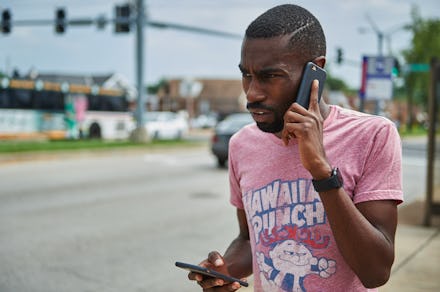DeRay McKesson Joins a Long Line of Black Activists to Run for Political Office

With the surprise announcement he's running for mayor of Baltimore, protester and former school administrator DeRay McKesson joins a long line of black activists to make the transition from street-level organizing to electoral politics.
The social media sphere is still buzzing after McKesson, 30, walked into the city's Board of Elections office Wednesday night — just minutes before the 9 p.m. deadline — and filed to run in an already crowded field of what is now more than a dozen Democratic primary candidates.
Charm City voters will hit the polls in just 12 weeks, and the sheer volume of hopefuls means any one of them could win the primary with a relatively small number of votes, as the Baltimore Sun points out.
Even by that measure, McKesson is something of a long shot — he has no political experience, and rose to prominence as a protester during the Ferguson, Missouri, demonstrations in August 2014, less than 18 months ago.
Still, his forebears weren't exactly traditional either. The points of comparison between McKesson and the Black Panther Party for Self-Defense are few and far between, for instance, but the Teach for America alum and Twitter star seems to hold a similar belief that the key to political power for black people lies in elected office.
Despite their erroneous reputation as gun-toting thugs, the Panthers — who were active in the 1960s and 1970s — enthusiastically embraced the prospect of serving in local and national government, particularly as a matter of revolutionary principle and strategy in their native Oakland, California.
"We were a political party, we were not a gang." — Bobby Seale
"That was part of the agenda, to run for political office," Bobby Seale, co-founder and former chairman of the Black Panthers, said, according to USA Today. "We were a political party, we were not a gang. We were concerned with issues and programs."
Below are three notable Panther leaders who tried their hand at running for office. In spite of a platform rooted in equal parts Marxist theory and radical black liberation — both of which have been treated with considerable hostility by the American status quo over the years — one ran a surprisingly competitive campaign.
1. Eldridge Cleaver
In 1968, Panther minister of information Eldridge Cleaver ran for president as the official candidate of the socialist Peace and Freedom Party. He won 0.05% of the popular vote, with 36,563 votes, but lost by a significant margin to six other candidates, including eventual winner Richard Nixon, runner-up Hubert Humphrey and, most tellingly, segregationist Alabama Gov. George Wallace.
2. Bobby Seale
In 1973, Panther co-founder and longtime chairman Bobby Seale ran for mayor of Oakland, California, where he'd founded the Panthers with Huey P. Newton seven years earlier. He forced a run-off with the incumbent and eventual winner John Reading, to date the last Republican — and second to last white man — to serve as mayor of the now-solidly Democratic city.
3. Elaine Brown
Elaine Brown was chair of the Black Panther Party from 1974 to 1977, the only woman to ever hold that position. She ran for an Oakland City Council seat in 1973, the same year Seale ran for mayor, and similarly came in second place.
Explaining the Panthers' political goals in the 1970s, Brown framed her and Seale's candidacies as part of a strategic move to take over Oakland and implement their revolutionary policies in the city, according to Joshua Bloom and Waldo E. Martin Jr.'s 2013 book Black Against Empire: The History and Politics of the Black Panther Party:
"We're talking about liberating the territory of Oakland ... Are we ready to defend at this moment? I don't think we are. The Oakland Police Department has got all the guns. There's a practical problem, when you talk about liberating territory, or establishing a provisional revolutionary government ... [But we] can begin by talking about voting in the city of Oakland, the Oakland elections, in April 1973, for Bobby Seale, for Elaine Brown."
Brown went on to run for president of the U.S. as the 2008 Green Party candidate, but stepped down in December 2007 when she became disillusioned with the party's racial and economic politics.
In 2016, the political landscape is noticeably different from what it was in the 1970s. The Black Lives Matter movement and its affiliated players, who've gripped the national imagination over the last year and a half in response to police violence against black communities, have drawn serious attention from local and presidential candidates, but largely avoided running for office themselves.
Nevertheless, the strategic merits of black mainstream political power remain as heated a topic of debate as ever. McKesson's candidacy inevitably complicates the conversation because, as outlined in a recent BuzzFeed article, his methods and high profile have earned him harsh criticism from within the movement itself.
But as disillusionment with the racial politics of the Obama presidency continues to grow, and as black people continue to face stark disparities at all levels of American society, it seems as good as time as any to get a movement candidate on the ballot.
Like Cleaver, Seale, Brown and the numerous others who came before him, McKesson's candidacy rests on the slimmest of hopes: that an elected official in the United States might one day actually be responsive and accountable to the needs of black Americans.